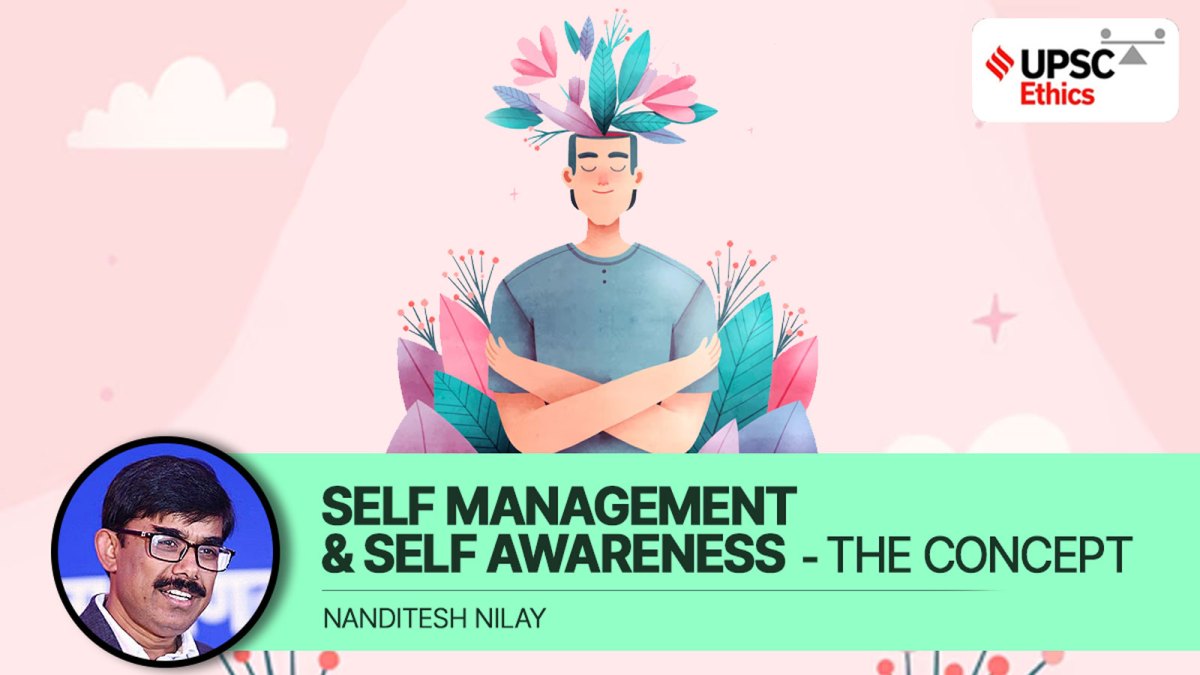UPSC Ethics Simplified | Emotional Intelligence: Self-Awareness and Self-Management – The concept
The 5 key building blocks of Emotional Intelligence consist of self-awareness and self-management. Nanditesh Nilay explains both concepts for the ethics paper of UPSC CSE. Also, do you know what is Johari Window? Let us learn.

Relevance: The topic is a part of UPSC CSE General Studies Paper-IV Ethics syllabus. Concepts are particularly relevant in the theory section. Aspirants will also find the article useful for their Essay paper and situation-based questions in personality tests. Moreover, the article’s essence will help aspirants professionally and in life.
Nanditesh Nilay writes for UPSC Ethics Simplified fortnightly. The first article will be a concept while the second article will be a caselet, based on the concept.
THE CONCEPT
Emotion + Intelligence
In the last article, we discussed emotional intelligence in general. The five key building constructs of Emotional Intelligence are self-awareness, self-management, motivation, empathy and social skills. Now we will discuss these key elements in detail. Our focus in this article will be specifically on self-awareness and self-management. As of now, we have understood well that in the process of becoming emotionally intelligent, we have to develop our ability to feel, read and listen to our feelings, thoughts and behaviour and simultaneously its impact on others too. Now let’s explore this meaning a bit more.
We all are emotional. It means we can feel, react and get impacted easily by the environment. We can express anything and everything because we feel like doing so. Social media has become a big hit because we have a platform to vent ourselves without any fetters of self-regulation.
Now comes intelligence which we inherit and develop over time. Qualifying in competitions and getting very good marks is a testimony of intelligence. Although to a limited extent but it has been already accepted by the society at large that examinations assess our intelligence. That’s fine but why rate only in terms of x or y exam? Even our problem-solving skills, decision making and idea generation are a sign of intelligence. Now we as human beings are living with both emotion as well as intelligence. Both are there in our system but rarely do they meet each other.
Although the moment we count emotion plus intelligence (E+I) our feelings get released from self-centeredness, our reactions turn into sensible responses, our ability gets a holistic view, our adaptability increases and so does our understanding. To do this we need to master the constructs of self-awareness, self-management, social skills, empathy and motivation. However, today we are discussing self-awareness and self-management.
So what is self-awareness?
Here by ‘self’ we mean physical, mental, emotional and spiritual self. And awareness is all about knowledge or understanding of something that exists. So for example if you are a student and preparing for civil services or a working professional but physically you are not aware in terms of exercise, food intake, or other things that are hurting your physical state what will happen? Your emotional state will suffer. You will be restless, irritated and lazy in day-to-day living. It will bring you near to unhappiness. And that will negatively impact your mental as well as spiritual state. Though self-awareness in the realm of emotional intelligence is about recognising one’s feelings and values as well as the living purpose and the physical habits, mental habits and spiritual intent will make our recognising ability more value-centric. So why not one should choose the right habits (physical as well as mental) and evolve spiritually? That will certainly in turn influence the self to feel and handle the emotions well. And what will you do? That is simply by self-management.
Discipline is key in managing the self
Do you have an idea about Johari Window?
It is a model or framework which gives us more windows (options) to understand ourselves, and even improve our self-awareness and communication. Joseph Luft and Harry Ingham brought this concept therefore it is named Johari, after their first name. It has 4 windows: open self, hidden self, blind self and unknown self. Open Self means what I know about myself other people also know the same. On the other hand, the Hidden Self is not the same. Here is what I know about myself other people have no idea of the same. In the Blind Self, the other person can know about you but you would be ignorant. And neither you know nor others about the self then that is the Unknown Self.
So assess and recognise yourself well and the widow which is defining your personality. It will lead you to a clear self-awareness state and then guide you to prepare well through self-management. These two constructs will prepare you for a better understanding of feelings, behaviour, values and attitudes. Later in the forthcoming articles we will discuss more about empathy and motivation and their role in emotional intelligence.
Point to ponder
German philosopher Schopenhauer was seated on a bench in a garden. He was looking unshaven and unkempt. Later a policeman prodded him with a baton, and asked, “Who are you?” The great philosopher woke up out of his thoughts, looked up and said, “I wish I knew.” What does this mean to you? That is your point to ponder.
Edited by Manas Srivastava
(The writer is the author of ‘Being Good and Aaiye, Insaan Banaen’ and ‘Ethikos: Stories Searching Happiness’. He teaches courses on and offers training in ethics, values and behaviour. He has been the expert/consultant to UPSC, SAARC countries, Civil services Academy, National Centre for Good Governance, Central Bureau of Investigation (CBI), Competition Commission of India (CCI), etc. He has PhD in two disciplines and has been a Doctoral Fellow in Gandhian Studies from ICSSR. His second PhD is from IIT Delhi on Ethical Decision Making among Indian Bureaucrats. He writes for the UPSC Ethics Simplified (Concepts and Caselets) fortnightly.)